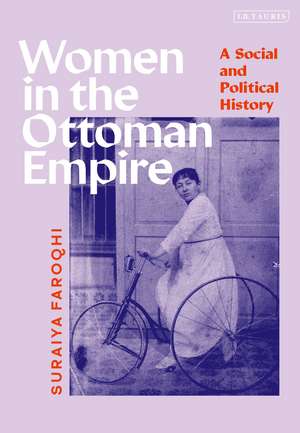Women in the Ottoman Empire: A Social and Political History
Autor Suraiya Faroqhien Limba Engleză Paperback – 22 feb 2023
| Toate formatele și edițiile | Preț | Express |
|---|---|---|
| Paperback (1) | 149.02 lei 3-5 săpt. | +41.28 lei 7-13 zile |
| Bloomsbury Publishing – 22 feb 2023 | 149.02 lei 3-5 săpt. | +41.28 lei 7-13 zile |
| Hardback (1) | 411.39 lei 6-8 săpt. | |
| Bloomsbury Publishing – 22 feb 2023 | 411.39 lei 6-8 săpt. |
Preț: 149.02 lei
Preț vechi: 171.61 lei
-13% Nou
Puncte Express: 224
Preț estimativ în valută:
28.52€ • 29.60$ • 23.78£
28.52€ • 29.60$ • 23.78£
Carte disponibilă
Livrare economică 01-15 martie
Livrare express 15-21 februarie pentru 51.27 lei
Preluare comenzi: 021 569.72.76
Specificații
ISBN-13: 9780755638260
ISBN-10: 0755638263
Pagini: 328
Ilustrații: 15 bw illus
Dimensiuni: 169 x 244 x 22 mm
Greutate: 0.45 kg
Editura: Bloomsbury Publishing
Colecția I.B.Tauris
Locul publicării:London, United Kingdom
ISBN-10: 0755638263
Pagini: 328
Ilustrații: 15 bw illus
Dimensiuni: 169 x 244 x 22 mm
Greutate: 0.45 kg
Editura: Bloomsbury Publishing
Colecția I.B.Tauris
Locul publicării:London, United Kingdom
Caracteristici
Covers the early-modern period, correcting monolithic perceptions of womens' history of the period as undifferentiated 'traditional' soceity
Notă biografică
Suraiya Faroqhi is Professor Emerita at Ibn Haldun University, Turkey. She has previously held positions at Istanbul Bilgi, Turkey, Ludwig-Maximilians-Universität, Germany and the Middle East Technical University. A leading expert on the social history of the Ottoman Empire, her books include Subjects of the Sultan (I.B.Tauris, 2000), The Ottoman Empire and the World Around It (I.B.Tauris, 2003), Artisans of Empire (I.B.Tauris, 2009) and The Ottoman and Mughal Empires (I.B.Tauris, 2019).
Cuprins
List of FiguresAcknowledgementsA note on spelling and transliterationIntroduction Prologue: A conspectus of Ottoman history 1. Ottoman women, Ottoman history: Coping with a changing world Part I (1500s to about 1700)2. The legal framework of family life 3. Dependent on work, investments and charity 4. Exceptionally talented, exceptionally active: women of distinction Part II (about 1700-1870s)5. Ottoman diversity: Female agency and survival in Ottoman Syria and Egypt 6. Ottoman diversity: Coping with relatives, the state and dependent capitalism Part III (1870-1918)7. Female teachers, journalists and actors: education as a source of survival skills8. Before 1912: Making a living through family relations, work and charity - and occasionally turning to crime9. In profound distress:Struggling to survive the disintegration of the empire (1912-18) Conclusion Suggestions for further reading: A bibliographical essay NotesTimelineGlossary
Recenzii
A remarkable book that masterfully traces the changes in the condition féminine during the early modern and modern periods. With a tremendous command of primary sources and the secondary literature, Faroqhi covers all the themes in the field by providing a fascinating panorama of the history of Ottoman women through the perspective of women's agency.
Women in the Ottoman Empire is a unique product of Suraiya Faroqhi's decades of experience. On the one hand, it provides a striking overview of the body of Ottoman/Middle Eastern women's studies, and on the other, it enriches the field with a touch that embraces the cultural, religious, social, and ethnic diversity of the empire. The book is an ideal introduction for newcomers to the field and a source of pride for experienced researchers, reflecting the existing scholarship.
Women in the Ottoman Empire is a unique product of Suraiya Faroqhi's decades of experience. On the one hand, it provides a striking overview of the body of Ottoman/Middle Eastern women's studies, and on the other, it enriches the field with a touch that embraces the cultural, religious, social, and ethnic diversity of the empire. The book is an ideal introduction for newcomers to the field and a source of pride for experienced researchers, reflecting the existing scholarship.
